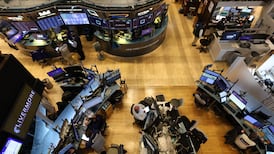Asian stocks were mostly lower on Monday after a disappointing U.S. jobs report and worse-than-expected trade numbers out of China raised questions about the underlying strength of the world’s biggest economies.
Meanwhile, crude oil prices soared on supply woes stemming from devastating wildfires in Canada, and the dollar edged up against its peers. Spreadbetters expected European shares to shrug off the weak Chinese data, picking a higher open for Britain’s FTSE, Germany’s DAX and France’s CAC following Friday’s rise on Wall Street.
MSCI’s broadest index of Asia-Pacific shares outside Japan stood effectively flat. South Korea’s Kospi fell 0.6 percent and Shanghai stocks retreated more than 2 per cent after data released over the weekend showed Chinese exports and imports fell more than expected in April. Elsewhere, Malaysian, Indonesian and Thai share markets also lost ground. Japan’s Nikkei bucked the trend and rose 0.6 per cent as the yen’s recent surge appeared to halt for now.
"The dollar has rebounded against Asian currencies in May, and Asian stock markets are slipping in correlation with their respective currencies," said Masahiro Ichikawa, senior strategist at Sumitomo Mitsui Asset Management. The South Korean won, Indonesian rupiah and Malaysian ringgit have fallen to six-week troughs against the dollar over the past few days.
US shares posted modest gains on Friday as the weaker-than-expected US jobs report fanned expectations that the Federal Reserve would have to hike interest rates at a very slow pace. The Dow gained 0.4 per cent and the S&P 500 edged up 0.3 per cent on Friday. US non-farm payrolls increased by 160,000 in April, the smallest gain since September, and below the 200,000 economists had expected. It prompted some financial institutions to lower their expectations of an interest rate hike for this year to just one from two before the report.
The dollar was up 0.2 per cent at 107.29 yen. The US currency initially fell in reaction to the lacklustre jobs report on Friday but bounced after New York Federal Reserve President William Dudley said two rate hikes this year were still a "reasonable expectation". The dollar remained within reach of an 18-month low of 105.55 yen plumbed last week. "Higher than expected annual wage growth keeps alive Fed rate hike hopes, but the growing risk is a delayed Fed rate hike," said Richard Grace, chief currency strategist at Commonwealth Bank. The euro was flat at $1.1408 after touching $1.1380, its lowest since April 29. The dollar index brushed 94.056, its highest since April 28. The Australian dollar was little changed at $0.7373 after sliding more than 1 per cent on Friday after the country's central bank slashed its inflation forecasts. US crude was up 1.9 percent at $45.51 a barrel and Brent crude rose 1.4 per cent to $46.02 a barrel as a wildfire raged through Canada's oil sands region, shutting half of the country's vast oil sands capacity. The oil market was also pondering weekend news of Saudi Arabia's appointment of a new energy minister to take over from veteran oil minister Ali al-Naimi. The new appointee, Khalid al-Falih, is a believer in reform in the oil market.
Copper slipped as the dollar firmed. A stronger greenback tends to make commodities like copper more expensive for non-US buyers. Three-month copper on the London Metal Exchange fell to as low as $4,720 a tonne, its lowest in a month. Spot gold eased by 0.3 per cent to $1,284.36 an ounce. The precious metal had hit a 15-month peak of $1.303.60 an ounce last week during a broad retreat by the dollar.
Reuters












